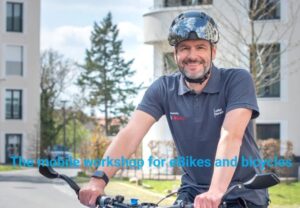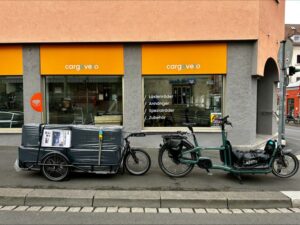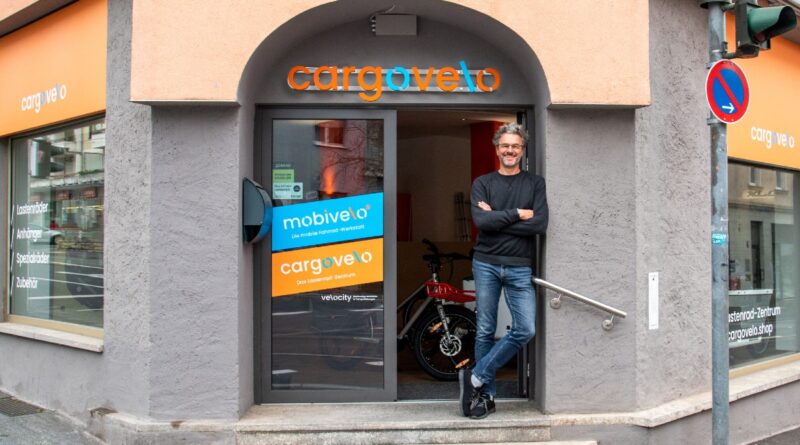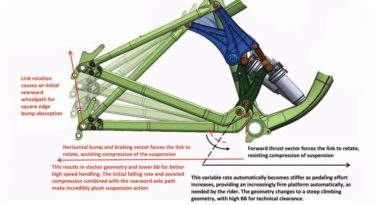Industry challengers: The retailer face of ‘cycling as transport’ change
Cycling Industry News had the good fortune to speak with pioneering, Würzburg, Bavaria, Germany, based cargo bike retailer, Stefan Dietrich, about his route into the industry, his approach to the business, and some challenges which are unique to an industry which has yet to make a shift to a more appropriate ‘cycling as transport’ focused business model.
Stefan represents a growing number of ‘cycling as transport’ focused market innovators. Our conversation comes about following a LinkedIn post in which Stefan mentions having 30 + demo bikes available, across a similar number of brands.
Over to you Stefan…
 As a good place to start, my approach is a little bit different, and, of course, that also means more money has been invested.
As a good place to start, my approach is a little bit different, and, of course, that also means more money has been invested.
At cargovelo, I have a wide range of bikes. I’m not the typical dealer that has 2 or 3 brands, and for every brand there are 10 bikes. I have more than 30 demo bikes available, across 30 or so brands.
And it’s cycling as transport that you’re focused on? eBikes. eCargo bikes?
Yes, it’s pure cargo bikes, nothing else. I’m a specialist dealer for cargo bikes, B2C and B2B. The shop, which I recently opened, that’s pure B2C, with customers, families, kids, transport for dogs. That’s the new thing.
You mentioned that before opening this shop you were already working in the cycle industry. You were already partnering with brands to do B2B sales?
Yes, but it was with a workshop, and a mobile workshop. This was the beginning of my work in the bicycle industry.
So I had this business idea to go, with a cargo bike, to the customers, repairing the bikes where customers needed the service and support. As a result, I came in touch with the first manufacturers of cargo bikes, because usually they didn’t have a big dealer network. As a result, they’re often searching for a service partner to better support customers.
I was pretty attractive for them, because the big issue with a with a broken cargo bike is that it’s bulky and heavy. You cannot easily transport a cargo bike when it’s not working. Even if there is a dealer, it’s often pretty hard to get it there. Sometimes it’s just a puncture, but it’s a puncture on a 70 Kg cargo bike, and that’s now hard to transport, or move it by foot, through the city. It doesn’t work.
So I came in touch with them and they asked me if I could service their bikes first. The first bike manufacturer was a German brand, who approached me, and then after a few months they asked if I could sell their bikes also.
At that moment I knew that I need a shop, and I need a lot of bikes – that this was going to be a big investment, because as I started with B2B solutions, so I would become one of the first purely cargo bike dealers. I sold bikes out of a 120 square metres, 6 metres high, unit located in an old industry area (where I still have my other workshop and the B2B focused business).
Once customers started asking more for a wider range of product, including cargo trailers, the big trailers – the 4 wheelers, the 3 wheelers – then I decided to also go more into the B2C, because the demand was clearly there. A lot of people approached me (asking) if I can also sell them a kids transport solution.
Now Urban Arrow was the first I had contact with, because they have the B2C and the B2B solutions divided. And then it started and then I decided to go bigger, with many brands reaching out to me. That’s where I’m now. To date I’ve spent 6 figures setting up the new business.

Before opening the current shop, how long had you been in the cycle industry, working with bike brands and distributors?
3 years.
So long enough to have strong relationships with your bike brands and distributors. Yet you’ve still found getting demo bikes, on anything other than regular purchase terms, extremely challenging?
Yes, and this is true across larger and smaller brands. What I’ve found is that the structures are not in place. The mindset isn’t there.
Now it’s fair to acknowledge that transport cost for a demo fleet is one factor. However, that doesn’t explain away the idea that dealers need to buy demo bikes on the same terms as the stock they’re purchasing.
I have asked for better terms, underlining that people, understandably, need to demo ride bikes before making a purchasing decision. Distributors and brands don’t seem to understand this. Every demo bike I own, I’ve paid for in full, on either 14 day, or, at best, 90 day, terms. Having a background in the auto industry, I find this astonishing. Yet, in the cycling industry, at present, this is ‘normal’.
I’ve invested 6 figures into my business, yet this is the support which brands and distributors offer their retail partners. Some said, ‘Yeah, we can talk a small, small, discount for a demo bike’, but it’s a few percentage, and, on the other hand, all insist on having at least one demo bike in the shop to give you a dealer contract.
So this is the controversy. For me it’s always like ‘please buy a bike from us, and then you can be our dealer’. So yeah, that’s the current, ‘normal’ approach. It’s sad. They (brands and distributors) are struggling. On the other, dealers with a portfolio like mine (a pure cargo bike specialist with 30 plus bike brands) are very rare. You only can find them in very big cities like Berlin or Munich or Cologne. And this clearly isn’t about the size of my business, or the length of my time in the industry. How can I say this? Isicargo in Berlin have a huge fleet. They also bought all these bikes (to deliver a demo experience for prospective customers).
When we think about the demo bike scenario, the frustration is that we are repeatedly told there is a surplus of stock. Despite this we (the industry) still seem unable to reformat the relationship between brands, distributors, and their retailers, providing targeted demo fleet support, made available to carefully selected retail partners.
Taking the example of the auto industry, or the motorcycle industry: It’s inconceivable that you would spend between €5,000 and €12,000 on a motorbike, or a car, without a proper test drive or a test ride. Yet the cycling industry (judged by its ongoing actions) remains to be convinced that supporting a retail partner delivered demo experience is a necessary thing (and we’re not talking a quick pedal around the car park, or the block).
Agreed. And as you suggested, I’m not expecting every store to have a full demo fleet, but I am expecting brands and distributors to identify their specialist retail partners; the one’s, like me, who facilitate the experiences which drive sales of cycling as transport product.
It’s the future of our industry.

In a very near future world, more people will ride to get from A to B than will ever ride for leisure, recreation, or sport. Critically, nobody buys a bike without testing it.
Occasionally I’ve been asked to sell a bike via a phone call, because the customer already drove it, at somewhere like Eurobike. Even then, I always challenging them. Why? Why do we think this is the right bike for you? Have you thought about this? What is your use case? Where are you living? Do you have a lot of hills near you? Are they steep? Is the 60Nm motor powerful enough, comparing where you live and travel against your flat, unloaded, test ride experience? Many didn’t know to even think about these factors. So I showed customers another solution, and they said, “Oh yeah, that’s great”.
I add this value (for customers, and the brands I sell).
I help new customers make informed choices.
The outcome? They come back and they buy another bike later on. That is why I think we need first of all to show what is possible, and then the prospective customers have to experience riding / drive it.
The advantage of my location (Würzburg) is that it’s pretty much a wide-open spot for almost every manufacturer I work with. Frankfurt and Nuremberg are 100 kilometres from me. Normally brands have dealers there and in between. There’s nothing in the surround 10 to 15 kilometres (of my store, so) I can reach up to 500,000 people. And I’m the single one. So yeah, it (the brand, distributor, retailer relationship) should be working much better than it currently does.
What do I offer the brands I work with (and the customers I serve on their behalf)? I offer all the services that the car business offers.
- When customers book a service with me, I provide a courtesy cargo bike.
- I offer to deliver and collect this from the customers home or place of work.
- I also offer the same auto industry approach for test drives. So if you want to test drive for the weekend you can test drive it for the weekend because all the bikes I have in my showroom are for demo riding.
I truly believe this is the only way. This is my approach.
I worked for over 30 years in sales. I’m extremely customer centric. I try to always see things from the customer’s side. What do they need? What do they want? How can I give the best buying experience? The auto industry knows that the demo is an essential part of the sales process, and an opportunity to deliver a brand experience which also engages the customers. A space where a competitive advantage can be achieved.
So, why is it that the cycling industry seems unable to deliver this kind of service and experience?
I’d say that a lot of people within the bike industry don’t know that the cargo bike business is so different to the normal bike business – they show this by their actions. Take stock ordering, pre-ordering for next year, as just one example.
The companies always approach retailers; even the smaller manufactures want to have a pre-order for next year. I’ve said ‘no, you can forget it’. I don’t do pre-orders. When distributors and brands are overloaded with stock, why should I do a pre-order? For one, there’s the question of how retailers can possibly know what the market is going to look like next year. Add to this, the brands and distributors don’t even give a discount for pre-orders.
Sometimes, with an account manager or area sales manager, you can see the only interest is in numbers. They only ask you how many bikes will you order next year.
Here, I ask, ‘how can you support me?’ The reply is typically, ‘I can send you some point of sale materials, some brochures….. It’s so archaic. What about the distributor or brand offering financial or service support for marketing and advertising? So far, from what I see, nobody thinks about this. What I used to know from the car industry doesn’t exist in the bike industry. Yet we charge customers car or motorcycle prices, and want to become ‘mobility solutions’ providers. The bicycle industry has a long way to go.
So, why should I place a pre-order?
Whose business does this truly benefit.
Not mine.
I get no support for demo bike purchasing. Get no support (incentive) for forward ordering. When I find out that the brand is offering a 25% discount, I get no meaningful support, despite being a retail partner whose paid a price for a product that no longer has a workable profit when that discount is applied. And then you have brands using their customer support channels to sell to their own retailers’ customers.
You can see a trend here. Not a healthy relationship at all.
The business model has to change. For customers. For retailers. For long term sustainability of the entire industry.
Cycling as transport represents a massive future opportunity. It simply won’t be fully unlocked with the current structures of business.
Despite all this, I am aiming to have an impact in this industry. I see the future mobility opportunity as a once in a lifetime shift. Delivering a service that supports people making new transport choices is why I’m here. It’s why I’ve invested 6 figures in my business. Why I’ve structured it the way I have.
I have also a 20-year background as an entrepreneur, so I know my numbers. I have a business plan. My, pure demo bike approach, is, in the current market, intentionally unique. That customers travel far to see me, to talk with me, to test ride bikes, to buy bikes, shows me that it has merit.
Here’s to making the future different to the past.
—————————————————————————
To find out more about Stefan’s business model
velocity stands for sustainable mobility and transport solutions related to bicycles.
cargovelo: the sale and rental of cargo bikes and trailers for bicycles.
mobivelo: the service and the mobile bicycle workshop.



